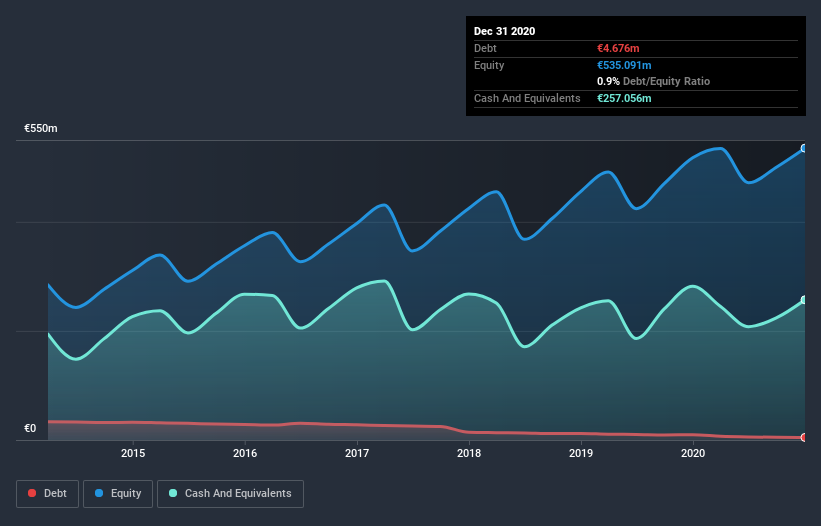Here's Why RATIONAL (ETR:RAA) Can Manage Its Debt Responsibly

David Iben put it well when he said, 'Volatility is not a risk we care about. What we care about is avoiding the permanent loss of capital.' So it seems the smart money knows that debt - which is usually involved in bankruptcies - is a very important factor, when you assess how risky a company is. Importantly, RATIONAL Aktiengesellschaft (ETR:RAA) does carry debt. But should shareholders be worried about its use of debt?
Why Does Debt Bring Risk?
Debt assists a business until the business has trouble paying it off, either with new capital or with free cash flow. Part and parcel of capitalism is the process of 'creative destruction' where failed businesses are mercilessly liquidated by their bankers. While that is not too common, we often do see indebted companies permanently diluting shareholders because lenders force them to raise capital at a distressed price. Of course, plenty of companies use debt to fund growth, without any negative consequences. The first thing to do when considering how much debt a business uses is to look at its cash and debt together.
Check out our latest analysis for RATIONAL
How Much Debt Does RATIONAL Carry?
You can click the graphic below for the historical numbers, but it shows that RATIONAL had €4.68m of debt in December 2020, down from €9.58m, one year before. However, it does have €257.1m in cash offsetting this, leading to net cash of €252.4m.

A Look At RATIONAL's Liabilities
According to the last reported balance sheet, RATIONAL had liabilities of €101.2m due within 12 months, and liabilities of €34.5m due beyond 12 months. Offsetting this, it had €257.1m in cash and €113.1m in receivables that were due within 12 months. So it actually has €234.5m more liquid assets than total liabilities.
This short term liquidity is a sign that RATIONAL could probably pay off its debt with ease, as its balance sheet is far from stretched. Simply put, the fact that RATIONAL has more cash than debt is arguably a good indication that it can manage its debt safely.
It is just as well that RATIONAL's load is not too heavy, because its EBIT was down 47% over the last year. When it comes to paying off debt, falling earnings are no more useful than sugary sodas are for your health. There's no doubt that we learn most about debt from the balance sheet. But ultimately the future profitability of the business will decide if RATIONAL can strengthen its balance sheet over time. So if you're focused on the future you can check out this free report showing analyst profit forecasts.
But our final consideration is also important, because a company cannot pay debt with paper profits; it needs cold hard cash. RATIONAL may have net cash on the balance sheet, but it is still interesting to look at how well the business converts its earnings before interest and tax (EBIT) to free cash flow, because that will influence both its need for, and its capacity to manage debt. During the last three years, RATIONAL produced sturdy free cash flow equating to 58% of its EBIT, about what we'd expect. This free cash flow puts the company in a good position to pay down debt, when appropriate.
Summing up
While it is always sensible to investigate a company's debt, in this case RATIONAL has €252.4m in net cash and a decent-looking balance sheet. So we don't have any problem with RATIONAL's use of debt. There's no doubt that we learn most about debt from the balance sheet. But ultimately, every company can contain risks that exist outside of the balance sheet. For example, we've discovered 2 warning signs for RATIONAL that you should be aware of before investing here.
At the end of the day, it's often better to focus on companies that are free from net debt. You can access our special list of such companies (all with a track record of profit growth). It's free.
If you decide to trade RATIONAL, use the lowest-cost* platform that is rated #1 Overall by Barron’s, Interactive Brokers. Trade stocks, options, futures, forex, bonds and funds on 135 markets, all from a single integrated account. Promoted
New: AI Stock Screener & Alerts
Our new AI Stock Screener scans the market every day to uncover opportunities.
• Dividend Powerhouses (3%+ Yield)
• Undervalued Small Caps with Insider Buying
• High growth Tech and AI Companies
Or build your own from over 50 metrics.
This article by Simply Wall St is general in nature. It does not constitute a recommendation to buy or sell any stock, and does not take account of your objectives, or your financial situation. We aim to bring you long-term focused analysis driven by fundamental data. Note that our analysis may not factor in the latest price-sensitive company announcements or qualitative material. Simply Wall St has no position in any stocks mentioned.
*Interactive Brokers Rated Lowest Cost Broker by StockBrokers.com Annual Online Review 2020
Have feedback on this article? Concerned about the content? Get in touch with us directly. Alternatively, email editorial-team (at) simplywallst.com.
About XTRA:RAA
RATIONAL
Engages in the development, production, and sale of professional cooking systems for industrial kitchens worldwide.
Flawless balance sheet with solid track record.


